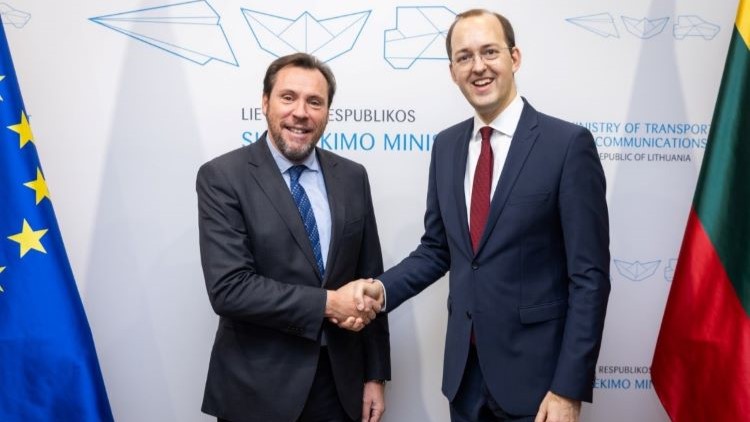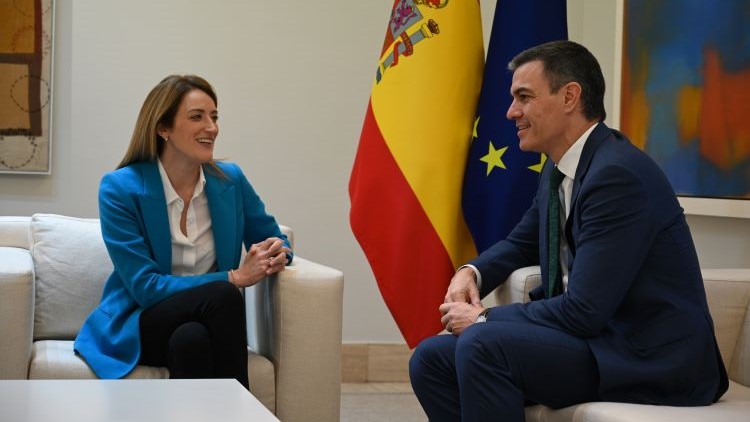The Diplomat
The Minister of Transport and Sustainable Mobility, Óscar Puente, yesterday expressed to the Minister of Transport and Communications of Lithuania, Marius Skuodis, the willingness of the Government of Spain to provide all possible facilities for the opening of a direct flight between Vilnius and Madrid.
The initiative to establish a direct flight between the two capitals is being promoted by the Lithuanian Government and yesterday Puente described it as very successful, according to his Department. The minister concluded a tour that also took him to Latvia and Estonia.
Likewise, Puente conveyed to Skuodis Spain’s great interest in the development of transport infrastructure projects in Lithuania, such as the Rail Baltica project and the modernization of that country’s railways. Specifically, he highlighted the great capacity and experience that Spanish companies have, backed by three decades of leading railway development in Spain and by their participation in emblematic international projects.
Furthermore, the minister expressed to his Lithuanian colleague Spain’s willingness to technically support Lithuania’s adaptation to the different railway gauges. They also addressed the possibility of studying joint investments and avenues for cooperation between the Lithuanian port of Klaipeda and Spanish ports. And they agreed on the need to provide greater scope to the review mechanism of the maritime ETS (Emmission Trading System), to avoid the risk of traffic diversion to neighboring non-European ports, and to design measures that adapt its application to the real availability of Alternative fuels.
The minister’s agenda in Vilnius also included a meeting with the Minister of Finance, Gintare Skaiste, with whom he spoke about infrastructure financing and the use of European and national funds for railway, road-rail and transport projects. Logistics. In addition, they analyzed the effects that the war in Ukraine is having on the railway, transport and logistics sector in Lithuania.
Óscar Puente completed his stay in Lithuania with two technical visits to that country’s transportation infrastructure. The first was to the railway traffic control center, located at the Vilnius Central Train Station, whose system was installed more than 10 years ago by the Spanish company Indra, which has been carrying out its maintenance and updating since then.
The second visit was to learn about the railway electrification project between Vilnius and Klaipeda, whose contract was awarded to Elecnor-Coxabengoa for an amount of more than 400 million euros and which is progressing at a good pace.
Latvia and Estonia
The day before, the Minister of Transport traveled to Latvia and Estonia, where he also expressed his support for the presence of Spanish companies in the Baltic railway megaproject. Some of these companies are already working on the deployment of the network and are interested in participating in the final phases.
During his speech in Riga, at the Latvian-Spanish Business Forum, Puente stated: “I am here to give certainty to the support of the Spanish administration to our companies and to the administrations and companies of the three Baltic countries so that the Rail Baltica project becomes a reality within the agreed deadlines,” he stated.
The minister opened the forum together with his Latvian counterpart, Kaspars Briškens, to whom in a bilateral meeting he stressed the essential role that Latvia plays in communications and logistics in the north of the European Union (EU) and the strategic importance of betting on improvement in transport and energy connections with the rest of the EU, even more so taking into account the geopolitical context that emerged after Russia’s invasion of Ukraine.
With Kaspars Briškens, he visited the Riga central station project, the most advanced of Rail Baltica, and whose roof is being carried out by the Spanish company Lanik, based in San Sebastian, a specialist in this type of structures.
That same day, Óscar Puente traveled to Tallinn, the capital of Estonia, to hold a bilateral meeting with the Minister of Climate, Kristen Michal, with whom, in addition to addressing issues related to Rail Baltica, he also discussed the common challenge of decarbonizing transport. maritime.
The minister explained to his Estonian colleague the great investment that Spain is making in the digitalization and sustainability of its ports. Likewise, he was interested in green maritime corridors, detailing that Spain is collaborating with other countries on this matter. In this context, he expressed his interest in working on a better implementation of the maritime ETS system to avoid the loss of competitiveness of European ports, a challenge in which Kristen Michal showed her willingness to collaborate.







